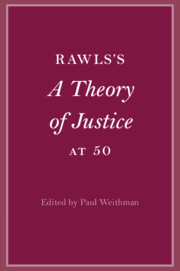Book contents
- Rawls’s A Theory of Justice at 50
- Cambridge Philosophical Anniversaries
- Rawls’s A Theory of Justice at 50
- Copyright page
- Dedication
- Contents
- Figures
- Contributors
- Acknowledgments
- Abbreviations of and Bibliographic Information for Rawls’s Works
- Introduction
- Part I Rawls and History
- 1 Taillight Illumination
- 2 The Theory Rawls, the 1844 Marx, and the Market
- 3 Rawls, Lerner, and the Tax-and-Spend Booby Trap
- 4 Rawls’s Principles of Justice as a Transcendence of Class Warfare
- 5 The Significance of Injustice
- Part II Developments between A Theory of Justice and Political Liberalism
- Part III Rawls, Ideal Theory, and the Persistence of Injustice
- Part IV Pluralism, Democracy, and the Future of Justice as Fairness
- References
- Index
4 - Rawls’s Principles of Justice as a Transcendence of Class Warfare
from Part I - Rawls and History
Published online by Cambridge University Press: 20 July 2023
- Rawls’s A Theory of Justice at 50
- Cambridge Philosophical Anniversaries
- Rawls’s A Theory of Justice at 50
- Copyright page
- Dedication
- Contents
- Figures
- Contributors
- Acknowledgments
- Abbreviations of and Bibliographic Information for Rawls’s Works
- Introduction
- Part I Rawls and History
- 1 Taillight Illumination
- 2 The Theory Rawls, the 1844 Marx, and the Market
- 3 Rawls, Lerner, and the Tax-and-Spend Booby Trap
- 4 Rawls’s Principles of Justice as a Transcendence of Class Warfare
- 5 The Significance of Injustice
- Part II Developments between A Theory of Justice and Political Liberalism
- Part III Rawls, Ideal Theory, and the Persistence of Injustice
- Part IV Pluralism, Democracy, and the Future of Justice as Fairness
- References
- Index
Summary
Critics of Rawls’s principles of justice complain that they ignore considerations of merit or desert. As meritocracy is the chief justification for the extremely wide inequalities between workers at the top and bottom today, we need to examine this complaint. I argue that ideas of desert or merit are inherently unsuited to informing principles of justice for the basic structure of society. Moreover, attempts to raise the principle of desert to the systemic level have historically formed the ideological grounds for irresolvable class warfare. Rawls’s principles of justice supply a normative perspective that wisely aims to transcend class warfare. Rawls’s conception of property-owning democracy, culturally shaped by public affirmation of the difference principle, offers a plausible vision of how society may achieve such transcendence.
Keywords
- Type
- Chapter
- Information
- Rawls’s A Theory of Justice at 50 , pp. 78 - 94Publisher: Cambridge University PressPrint publication year: 2023

